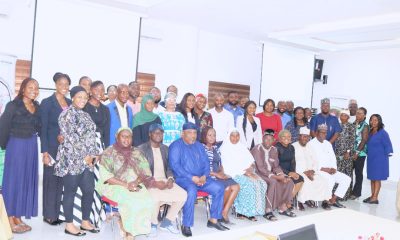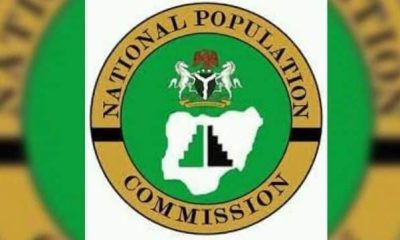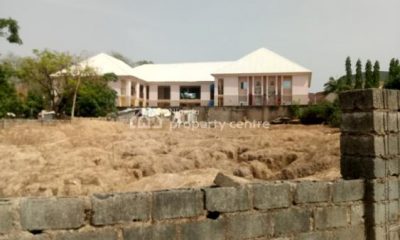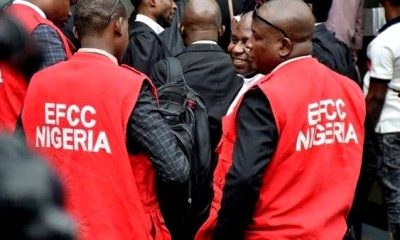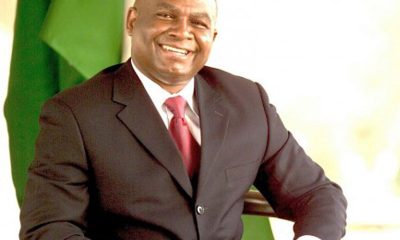FEATURES
Appraising Barriers Limiting Women’s Participation in Nation Building
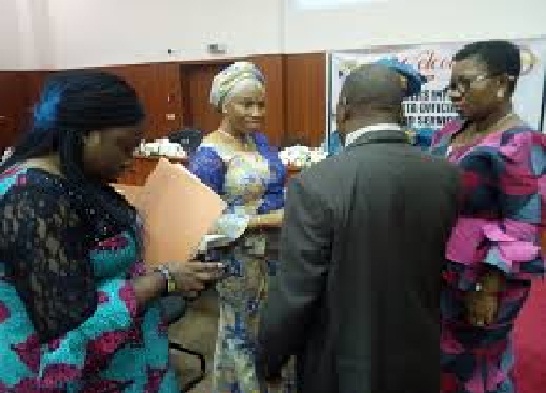
Data from statista.com reveals that there are approximately 105.57 million females and 107.83 million males in Nigeria at 2021.
The World Bank says while women constitute approximately 49 per cent of the population, females account for approximately 51 per cent of the population.
In spite of the close gap in gender ration in the population attaining gender parity in various aspects of national life has remained a mirage for women and girls.
Gender advocates say discrimination, marginalisation, patriarchy, cultural and religious norms among others contribute to the slow pace of attaining gender equality in Nigeria and in many other developing countries.
The international community has taken several initiatives such as Sustainable Development Goals (SDGs) to engender gender parity
The SDG no five is specific about gender parity is its aim is to promote gender equality, ending all forms of discrimination against all forms of discrimination against women and children.
The goal five also promotes ways to end violence and exploitation of women and girls; eliminate harmful practices such as early child and forced marriage, and female genital mutilation.
It also seeks increasing value of unpaid care and promoting shared domestic responsibilities; ensuring full participation of women in leadership and decision-making; and ensuring access to universal reproductive rights and health.
The barriers women face in contributing their quota to national development is felt in virtually every sector, including mining, one of the mainstays of the nation’s economy.
Some women interest groups and gender advocates are pushing back against the inequalities.
An advocate, Janet Adeyemi, said there was need to address limiting factors to women’s participation in mining in Nigeria for maximum productivity.
Adeyemi, the Founder and National President of Women in Mining Nigeria (WIMIN), spoke at a 2-day High Level National Policy Dialogue themed: ”Mainstreaming Gender in the Solid Mineral Sector in Nigeria’’,
Adeyemi listed lack of funding, lack of access to titles; and lands as two of the factors that have ensured a systemic indoctrination against women in the mining sector.
“Women hardly have big mining companies, only a few had, yet they bear the brunt of mining activities, whether they are directly involved or indirectly”, she said.
She called for the need for the government to empower women with loans and equipment to make them active participants in the mining sector.
She said young women should also be mentored through such programmes as Science Technology, Engineering and Math (STEM).
The 8th Assembly was made up of just seven females Senators and 22 House of Representatives members out of the 109 Senators seats and 360 Rep seats.
This figure represents 6.4 percent and 6.1 percent of the two chambers of the legislature..
During the just-disbanded 9th Assembly and had seven Senators while the figure of female reps decline to 11 seats.
In the newly-inaugurated Assembly the story is not different as only a combined 17 female federal lawmakers where elected.
Many women who signified interest in contesting for positions in the legislatures also stepped down as men claimed the office of Senate President, Deputy Senate President, Speaker House of Reps and Deputy Speaker, House of Reps.
The UN Women Representative to Nigeria and the Economic Community of West African States (ECOWAS), Ms. Beatrice Eyong, said this calls for concern.
She spoke at a one-day meeting of, `He` for `She` organised by the Centre for Democratic Development (CDD), ‘He’ for `She’ is a term for men who are supporting gender equality.
“Women participation in politics in Nigeria is very unsatisfactory and unacceptable. If you look at the African sub-region, Nigeria is one of the lowest countries as far as representation on the parliament is concerned.
“As at 2022 Nigeria has just 4.1 per cent female presence in the federal parliament while in other countries like Rwanda it is 67 per cent, Senegal is about 57 per cent.
“These are all countries with a very high level representation of women in parliament, but for Nigeria it is something that is very unacceptable”, she said.
The President of Women in Politics Forum (WiPF), Ebere Ifendu, told said the low participation of women in leadership, elective positions and governance had persisted in spite of d advocacies by Civil Society Organisations (CSOs).
Ifendu said there was need to take deliberate steps to ensure gender equality, which according to her will benefit national development efforts.
She said the need for the participation and inclusion of women in political and public offices could not be overstated.
“The national average of women’s political participation in Nigeria remains a mere 6.7 percent both in elective and appointive positions, far below the global average of 22.5 per cent.”
“Africa’s regional average is 23.4 percent and the West African sub-regional average is 15 percent.
“Sadly, the situation continues to persist despite the strong advocacy for gender equality and inclusive development by social movements and organisations”, said Director, Women in Management, Business and Public Service (WIMBIZ), Hansatu Adegbite
Adegbite believes that one area that should attract the attention of women empowerment advocates and policy makers and implementers is the health sector.
The right and the rate of maternal mortality in Nigeria is becoming alarming as study reveals that Nigeria has about 512 maternal mortalities per 100,000 births.
“As you know, Nigeria has one of the highest maternal mortality ratios in the world of 576 maternal deaths per 100,000 live births.
“That’s unacceptable, especially when we know that 95 percent of those deaths are preventable”, protested the National President Medical Women Association of Nigeria (MWAN), Dr Adekemi Otolorin.
Unfortunately, experts say, most of the pregnancies are unplanned due and occur in household without access to family planning.
“Given the God-given role that women play in the continuation of the human race, our expectation is that they should receive special care of stakeholder and governments
“Sexual and reproductive health services for women should be free of charge or at best affordable. This is not the case in Nigeria. Sadly, up to 70 per cent of health care expenses in Nigeria are out-of-pocket expenses.
“Many women shun health facilities and go in search of prayers houses or look for cheap options by buying drugs from patent medicine vendors who cannot diagnose and often inappropriate medications”, she said.
Granted modern health care is expensive but the availability of health insurance is expected to cushion the effect on individual pockets.”
She urged the full implementation of the Basic Health Care provision Fund so that all women of reproductive age and children under the age of five years could receive free health services under the national health insurance scheme (NHIS).
The Primary Health Cares are supposed to take care of these challenges but unfortunately they cannot help matters as most of them in the FCT merely exist.
Another area of concern for gender advocates is sexual gender based violence
According to Derby Collins-Kalu a Senior Programme Officer in charge of Gender Based Violence (GBV), Institute of Human Virology, Nigeria (IHVN), 17 million Nigerian women have experienced intimate or non-intimate violence and the number is alarming.
Sadly, while women have gender-related challenges, they also share other health challenges in common such as diabetes, hypertension, tuberculosis and malaria.
Addressing these barriers will pave the way for the society to benefit from the immense physical, intellectual, mental other energies that women can unleash. (NAN).
FEATURES
We Have Made Undeniable Progress: President Bola Tinubu’s Second Anniversary Speech
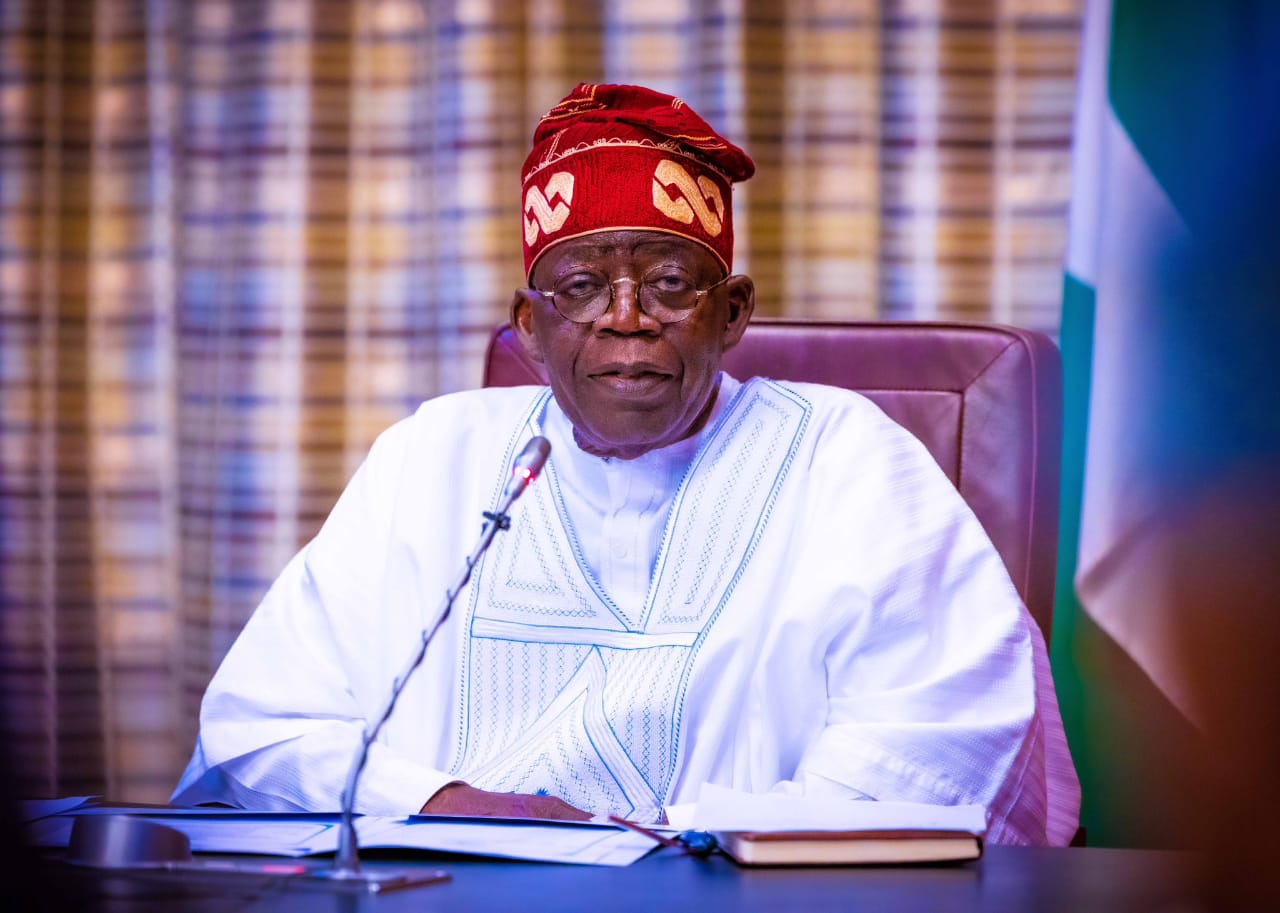
Fellow Nigerians, as we mark the second anniversary of our administration, I salute your resilience and undaunted spirit. Two years ago, you entrusted me with the sacred responsibility to lead our nation at a time of historic challenges. Together, we have faced these headwinds with courage and determination.
The economic and general situation of the country I inherited required that we redirect the country’s affairs with a bold and new vision.
I immediately implemented two necessary policies to stop our country from further drifting into the precipice. It was apparent that if the federal government and the other two tiers of government must remain viable and cater to the citizens’ welfare, we must do away with decades-long fuel subsidies and the corruption-ridden multiple foreign exchange windows. The two were no longer sustainable and have become a chokehold on our nation’s neck, strangling our nation’s future.While our administration has implemented the reforms to restore and reinvigorate our national economy and strengthen our social fabric as a strong and united country, I must thank my fellow citizens for your unrelenting support and belief in the grand vision we share to uplift our nation and renew our collective hopes and aspirations.
We are halfway through the journey that began 24 months ago. Today, May 29, 2025, offers our administration the opportunity to share again how far we have gone and our progress in steering our country along the critical path of socio-economic development.
When we embarked on this journey, propelled by a burst of hope and abiding faith in Nigeria’s unity and progress, I made a pledge before God and fellow countrymen and women to confront Nigeria’s challenges head-on by rebuilding trust, fostering prosperity, and restoring our nation’s economic health. Today, I proudly affirm that our economic reforms are working. We are on course to building a greater, more economically stable nation.
Under our Renewed Hope Agenda, our administration pledged to tackle economic instability, improve security nationwide, reduce corruption, reform governance, and lift our people out of poverty.
While implementing the reforms necessary to strengthen our economy and deliver shared prosperity, we have remained honest by acknowledging some of the difficulties experienced by our compatriots and families. We do not take your patience for granted. I must restate that the only alternative to the reforms our administration initiated was a fiscal crisis that would have bred runaway inflation, external debt default, crippling fuel shortages, a plunging Naira, and an economy in a free-fall.
Despite the bump in the cost of living, we have made undeniable progress.
Inflation has begun to ease, with rice prices and other staples declining. The oil and gas sector is recovering; rig counts are up by over 400% in 2025 compared to 2021, and over $8 billion in new investments have been committed. We have stabilised our economy and are now better positioned for growth and prepared to withstand global shocks.
In 2025, we remain on track with our fiscal targets. Gross proceeds per barrel from crude oil are broadly aligned with our forecasts as we intensify our efforts to ramp up production. Our fiscal deficit has narrowed sharply from 5.4% of GDP in 2023 to 3.0% in 2024. We achieved this through improved revenue generation and greater transparency in government finances. In the first quarter of this year, we recorded over N6 trillion in revenue.
We have discontinued Ways & Means financing, which has been a major contributor to high and sticky inflation. The NNPC, no longer burdened by unsustainable fuel subsidies, is now a net contributor to the Federation Account. We are also achieving fuel supply security through local refining.
Our debt position is improving. While foreign exchange revaluation pushed our debt-to-GDP ratio to around 53%, our debt service-to-revenue ratio dropped from nearly 100% in 2022 to under 40% by 2024. We paid off our IMF obligations and grew our net external reserves by almost 500% from $4 billion in 2023 to over $23 billion by the end of 2024.
Thanks to our reforms, state revenue increased by over N6 trillion in 2024, ensuring that subnational governments can reduce their debt burden, meet salaries and pension obligations on a timely basis, and invest more in critical infrastructure and human capital development.
One of our administration’s most impactful achievements is our bold tax reform agenda, which is already yielding results. By the end of 2024, our tax-to-GDP ratio rose from 10% to over 13.5%, a remarkable leap in just one year. This was not by accident. It results from deliberate improvement in our tax administration and policies designed to make our tax system fairer, more efficient, and more growth-oriented.
We are eliminating the burden of multiple taxation, making it easier for small businesses to grow and join the formal economy. The tax reforms will protect low-income households and support workers by expanding their disposable income. Essential goods and services such as food, education, and healthcare will now attract 0% VAT. Rent, public transportation, and renewable energy will be fully exempted from VAT to reduce household costs further.
We are ending the era of wasteful and opaque tax waivers. Instead, we have introduced targeted and transparent incentives supporting high-impact manufacturing, technology, and agriculture sectors. These reforms are not just about revenue but about stimulating inclusive economic growth.
There is a deliberate focus on our youth, who a friendlier tax environment for digital jobs and remote work will empower. Through export incentives, Nigerian businesses will be able to compete globally. Our National Single Window project streamlines international trade, reduces delays, and enhances Nigeria’s competitiveness.
To promote fairness and accountability, we are establishing a Tax Ombudsman, an independent institution that will protect vulnerable taxpayers and ensure the system works for everyone, especially small businesses.
Most importantly, we are laying the foundation for a more sustainable future by introducing a new national fiscal policy. This strategic framework will guide our approach to fair taxation, responsible borrowing, and disciplined spending.
These reforms are designed to reduce the cost of living, promote economic justice, and build a business-friendly economy that attracts investment and supports every Nigerian. Together, we are creating a system where prosperity is shared, and no one is left behind.
We have breathed new life into the Solid Minerals sector as part of our efforts to diversify the economy. Revenue has increased phenomenally, and investors are setting up processing plants as the sector dumps the old pit-to-port policy and embraces a new value-added policy.
We have also repositioned our health sector despite all odds.
Over 1,000 Primary Health Centres are being revitalised nationwide. An additional 5,500 PHCs are being upgraded under our Renewed Hope Health Agenda. We are establishing Six new cancer treatment centres. Three are ready. We offer free dialysis services in pilot tertiary hospitals and subsidise the service in others. Under the Presidential Maternal Health Initiative, over 4,000 women have undergone free cesarean sections. Lastly, we have expanded Health Insurance Coverage from 16 million to 20 million within two years.
As a result of our bold and deliberate policies, the economy is growing stronger again. Real GDP rose by 4.6% in Q4 2024, with full-year growth of 3.4%. This is one of the strongest in a decade.
Without a responsive and reliable national security infrastructure that can protect lives and properties, our economy will not perform optimally, and those who seek to harm us will impair and disrupt our way of life. Our administration is committed to the security and safety of our people. For our government, protecting our people and their peaceful way of life is the utmost priority.
Since I assumed our country’s leadership, our administration has improved collaboration among security agencies, increased intelligence-driven operations, and better ensured the welfare of our armed forces and security personnel. I use this opportunity to salute the courage and everyday sacrifice of our service men and women. We may not always witness the tremendous efforts they make to keep us safe, but we benefit every day from the results of their dedication. Even if we do not thank them often enough, they willingly face danger so we can go about our lives freely and without fear.
Our military, police, and intelligence agencies are committed to always responding to emerging security threats and new challenges because it is the patriotic duty they owe a grateful nation.
Amid the new security challenges, we can report some successes. In some areas of the northwest, hitherto under the control of bandits, our gallant armed forces have restored order, reducing and eliminating threats to lives and livelihoods. With the success achieved, farmers are back tilling the land to feed us. Highways, hitherto dangerous for travellers, have become safer. Our security agencies have succeeded many times in rescuing the abducted citizens from the hands of their tormentors. I promise you, we shall remain vigilant, as I told security chiefs during the last meeting to up their game and collaborate to end this plague of evil men. Every Nigerian deserves to live without fear.
Outside of Security, we have prioritised human capital development as a central pillar of our national development strategy.
To this end, we have significantly expanded access to quality education through infrastructure investments and the student loan scheme to support indigent students in tertiary institutions. Through the Renewed Hope Health initiative, our administration has begun equipping health facilities and deploying skilled personnel to unserved areas. We are also strengthening our response to public health threats and implementing targeted social investment schemes.
Our youth empowerment initiatives include access to funds, skill development, and creating employment opportunities. Through our MSME support, we empower the next generation and bridge inequality. In our mission to empower the next generation, we have taken bold steps to place young Nigerians at the heart of national development. Nowhere is this more evident than at the National Agency for Science and Engineering Infrastructure (NASENI), where the current management is making giant strides. NASENI has embraced a digital-first approach, introduced real-time dashboards, and implemented end-to-end e-procurement through its Unified ERP System—setting a new governance benchmark for public institutions.
Through bold, high-impact programmes like Innovate Naija, Irrigate Nigeria, the Asset Restoration Programme, and the Renewable Energy and Innovation Park in Gora, NASENI drives inclusive industrialisation at scale. From assembling electric vehicles and reviving idle assets to launching Africa’s most advanced Rapid Diagnostic Kit Factory and training female drone engineers through the NASCAV programme, these initiatives are creating jobs, restoring dignity to work, and opening up a future of possibilities for our youth. This is the movement we promised—a government of action powered by the energy and innovation of young Nigerians.
Agriculture and food security are top priorities of our Renewed Hope Agenda. We have launched aggressive initiatives to boost local food production, support farmers, and stabilise food prices. We have also invested in mechanised farming by procuring thousands of tractors, other farming tools, and fertilisers.
Under the Renewed Hope Agenda, the federal government has continued with major road construction and rehabilitation projects across all geopolitical zones, from the Abuja-Kaduna-Zaria-Kano Dual Carriageway, the 9th Mile-Oturkpo-Makurdi Road, the Lagos-Calabar Coastal Highway, Abuja-Lokoja-Benin Road, Enugu-Onitsha Expressway, Oyo-OgbomosoRoad, Sokoto-Badagry Road, Enugu-Port Harcourt Expressway, Second Niger Bridge Access Road to Bodo-Bonny Road among hundreds of ongoing road projects across the country.
We have launched initiatives to improve electricity generation by upgrading generation and transmission infrastructure and investing in off-grid solar energy to power our homes, business premises, industries, schools and hospitals.
In the spirit of democracy and national renewal, we are preparing to welcome the world to Nigeria soon for the Motherland Festival. This landmark gathering will spotlight our rich heritage, dynamic creative industries, and the vibrant energy of our people. It will showcase Nigeria’s beauty through tourism, culture, and innovation, inviting the world to rediscover our nation.
The Nigerian diaspora plays a vital role in our national transformation. Their expertise, investment, and global perspective are key to shaping the future we seek. In recognition, the government has introduced policies like the diaspora bond and the non-resident Bank Verification Number to make it easier for Nigerians abroad to invest, engage, and contribute meaningfully to the country’s progress.
The Motherland Festival will bring together voices from across the continent and the diaspora in a decisive moment of unity and purpose, affirming that Nigeria is not only a leader in Africa but a committed global partner ready to engage, inspire, and lead.
Once again, I acknowledge the sacrifices many Nigerians have made and continue to make as we reposition our country, not just for today but for generations yet unborn. Our journey is not over, but our direction is clear. So is our resolve to tackle emerging challenges. By the Grace of God, we are confident that the worst is behind us. The real impact of our governance objectives is beginning to take hold. The future is bright, and together, we will build a stronger, more inclusive Nigeria that we can all be proud of.
Thank you all, and May God continue to bless the Federal Republic of Nigeria.
PRESIDENT BOLA AHMED TINUBU,
ASO ROCK, ABUJA
29/5/2025
FEATURES
Tinubu’s 2-Year Security Scorecard: Gains, Pains and Future Prospects

As President Bola Tinubu marks his second year in office, the question on many Nigerians’ minds is: has the administration’s security approach yielded tangible results?
Nigeria’s security challenges are multifaceted and deeply entrenched. No doubt the administration took off on May 29, 2023 amidst myriads of security challenges across all regions of the country but the administration has introduced various measures to tackle the menace.
While some progress has been made, much work remains to be done.
The National Security Adviser (NSA), Mallam Nuhu Ribadu, recently revealed that over 13,543 terrorists and other criminal elements have been killed across Nigeria since May 2023.
He added that over 10,000 hostages have been rescued during the two years of President Tinubu in office.
According to him, a total of 124,408 fighters of Boko Haram and Islamic State in West Africa Province (ISWAP), along with their family members, surrendered to Nigerian forces and are undergoing rehabilitation through the government’s de-radicalisation and reintegration programme.
Also, the Minister of Defence, Alhaji Mohammed Badaru, during a ministerial briefing recently, said that Nigeria currently grapples with multiple security challenges.
Badaru said the administration which came in with promises to enhance security, had been making determined efforts to fulfil its promise, adding that contemporary security challenges in Nigeria were neither isolated nor simplistic.
He said the challenges were deeply rooted in decades-long socio-political fractures, economic dislocations, porous transnational borders, foreign insurgent influences and a global terrorism matrix that continues to mutate beyond classical military doctrines.
According to him, President Tinubu’s firm directive, “Enough is enough,” signals reinforcement of political will, which also spurs the military to double its efforts in conjunction with all stakeholders towards overcoming the security challenges.
The key achievements include enhanced synergy within the AFN and with other security agencies, defence equipment procurement, improvement in defence production and capacity development of troops.
Others are troops’ welfare, increasing partnerships with friendly nations/organisations and sustaining stakeholder engagement sessions.
It is pertinent to note that despite these claims, the Nigerian Military has recorded seven terror attacks on its bases in 2025 despite claimed successes against terrorists and bandits.
The Defence Headquarters in 2024 declared 106 terrorists/bandits leaders wanted with a vow to eliminate them from the battle field.
Several of such terrorist leaders, at least 22, have been eliminated.
Among the prominent terrorist leaders eliminated are Abu Bilal Minuki, Haruna Isiya Boderi, Kachallah Alhaji Dayi, Kachallah Idi, Kachallah Kabiru, Kachallah Azailaru, and Alhaji Baldu.
On his part, the Director of Defence Media Operations, Maj.-Gen. Markus Kangye, revealed that Nigerian troops seized a substantial cache of arms and ammunition during recent operations targeting non-state actors.
Kangye revealed that more about 3,002 firearms and 71,532 rounds of ammunition were recovered during coordinated offensives in Sambisa Forest, the Timbuktu Triangle, and the Tunbums along the Lake Chad Basin.
In spite of these successes however, there were some setbacks recorded as a result of the recent resurgence of terrorist attacks targeting troops’ locations and vulnerable communities in the North East, particularly, Borno.
On Jan, 4, Boko Haram terrorists riding on motorcycles and gun trucks attacked troops’ location at Sabon Gari village of Damboa local government area killing at least six soldiers.
On March 25, terrorists attacked troops at Goneri in Gujba Local Government Area of Yobe and another attack on a military location in Wajiroko near Sabon-Gari in Damboa Local Government Area in Borno killing at least four soldiers with some wounded in action.
These are some of the incidents that brought a sort of set of setbacks to the gains hitherto made in the fight against insurgency, a development that slightly affected the planned return of some Internally Displaced Persons (IDPs) in Borno.
It is based on the foregoing that the Chief of Army Staff (COAS), Lt.-Gen. Olufemi Oluyede, rejigs the operation in Borno appointing new field commanders including Theatre Commander for Operation Hadin Kai North East.
The current Theatre Commander, Maj.-Gen. Abdulsalam Abubakar, has reiterated the commitment of the troops to sustain the renewed tempo of operation with the sole objective of defeating the terrorists.
He said the troops had continued to show resilience in defeating the terrorists across the theatre of operation with several successes so far recorded.
According to him, in the recent attack on Kukawa area of Borno, troops with support of air components defeated the terrorist onslaught neutralising 28 terrorists.
He said the terrorists’ resort to attacking isolated communities in search of logistics, equipment or fighters, close-ledger, and outdoor high-value targets, suggests “desperation of the terrorists leaders to reassess themselves, demonstrate strength, recruit more fighters, and amass logistics interpolation for future offensive across the theatre”.
On procurement of equipment, the administration of President Tinubu has a high level of commitment with the acquisition of several modern platforms including armoured vehicles, aircraft and ships as well as drones and other equipment.
The Chief of the Air Staff (CAS), Air Marshal Hasan Abubakar, had during the induction of two newly acquired Agusta 109S Trekker Helicopters as part of activities marking NAF’s 61st Anniversary, announced that additional 49 aircrafts were being expected within the next two year.
Abubakar said the 49 aircraft being expected include 10 additional A-109S trekkers, 12 AH-1 Zulu attack helicopters, 24 M-346 attack and ground attack aircraft, and three Kata 295 medium airlift aircraft.
According to him, these acquisitions will significantly bolster NAF precision strike, ground attack, and air mobility capabilities, to support the counter terrorism, and counterinsurgency operations.
Providing an overview of operational achievements, the CAS disclosed that in the past year alone, the NAF has flown over 4,500 hours across 2,304 sorties, executing nearly 2,000 counterinsurgency missions.
He added that over 2,600 anti-banditry sorties were carried out, resulting in 4,670 hours of flight time.
According to the CAS, the NAF in support of efforts to combat economic sabotage, conducted 366 sorties targeting crude oil theft and illegal refining, amassing more than 1,450 hours of flight time.
Similarly in the fight against crude oil theft, the NAF said the Air Component of Operation Delta Safe had between January and May 2025, executed over 173 missions and 265 sorties, accumulating approximately 270 flying hours in support of joint military operations and independent strikes across the zone.
A statement by NAF’s spokesman, Air Commodore Ehimen Ejodame, said that the airstrikes destroyed more than 100 illegal refining sites, 53 boats, 74 cooking tanks, two reservoirs, and several transport vehicles.
On his part, the Chief of Naval Staff (CNS), Vice Adm. Emmanuel Ogalla said the Nigerian Navy had taken delivery of three helicopters and three ships to boost its operations.
Ogalla said the service had between January to May 2025 arrested 215 suspects, 26 vessels and deactivated 468 Illegal Refinery Sites.
He added that an estimated quantity of 6.5 million litres of stolen crude oil and seven million litres of illegally refined Automated Gas Oil were seized and appropriately handled, while 361 wooden boats, 1,107 dugout pits and 279 storage tanks were deactivated.
According to the CNS, the Navy since January 2025, destroyed 103 Illegal Refinery Sites and arrested 34 suspects linked to crude oil theft.
The administration has successfully reduced the influence of the Indigenous Peoples of Biafra (IPOB) and its armed wing, the Eastern Security Network (ESN), in the Southeast, particularly in enforcing sit-at-home orders.
Tinubu’s administration has partnered with the United Nations Office of Counter-Terrorism (UNOCT) to host a high-level African counter-terrorism summit and has implemented existing counter-terrorism measures.
The administration launched the Pulaku Initiative, a N50 billion project aimed at providing non-kinetic solutions to address banditry and insurgency in Northern Nigeria.
The administration should prioritize community-based security initiatives, promoting socio-economic development and inter-communal dialogue.
Completing police reform efforts, including decentralising policing and enhancing accountability, could improve internal security.
Overall, while President Tinubu’s administration has made some progress in addressing insecurity, the persistence of attacks and criticisms of his security approach highlight the need for a more effective and comprehensive strategy.
The administration should do more in addressing economic challenges, such as inflation and employment, particularly through agriculture and other empowerment programmes to reduce the root causes of insecurity. (NANFeatures)
FEATURES
What Future For Catholics Under Pope Leo XIV?
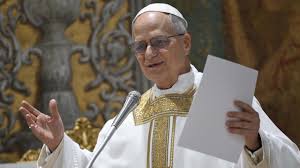
In unprecedented and emotionally resonant moments for the global Catholic community, Cardinal Robert Prevost of Chicago was elected Pope on May 8 and inaugurated on May 18.
He became Pope Leo XIV, the 267th successor to St. Peter and the first American-born pontiff in the history of the Roman Catholic Church.
The election of Leo XIV follows the death of Pope Francis on April 21, a pontiff celebrated as “the people’s pope.
”Leo XIV’s inauguration message resonated with advocacy for peace and harmony in a troubled world.
The pontiff said he wanted the Catholic Church to be a “small leaven of unity” in a time of “too much discord and too many wounds”.
Leo harped on the need to preserve the church’s rich heritage while confronting modern challenges.
“In this time of ours, we still see too much discord, too many wounds caused by hatred, violence, prejudice, the fear of difference, and an economic paradigm that exploits the earth’s resources and marginalises the poorest.
“For our part, we want to be a small leaven of unity, communion and fraternity within the world; we want to say to the world, with humility and joy; look to Christ; come closer to him,” he said.
Born on Sept. 14, 1955 in Chicago, Leo XIV was raised in a culturally rich American city and studied mathematics at Villanova University.
He pursued his priestly formation at the Catholic Theological Union in Chicago before obtaining a doctorate in Canon Law from the Pontifical College of St. Thomas Aquinas in Rome.
It was not his academic accolades but the 14 years he spent as a missionary in Peru that most deeply shaped his pastoral identity.
There, in one of South America’s poorest regions, he worked closely with the marginalised, gaining firsthand insight into social injustice, poverty, and spiritual hunger.
This lived experience grounded his commitment to the poor, informed his theology of proximity, and laid the foundation for a papacy rooted in social justice, humility, and global outreach.
Leo XIV’s choice of name is more than ceremonial; it is a carefully calibrated message.
His name honours two great figures in Church history: St. Leo the Great, a fifth-century pope renowned for his doctrinal clarity and steadfast defense of Rome during political and theological turmoil.
It also honours Pope Leo XIII, whose groundbreaking 1891 encyclical Rerum Novarum addressed the plight of workers during the industrial age and laid the foundation for modern Catholic social teaching.
Prof. Brandon Gallaher of the University of Exeter, UK, likened Leo XIV to Francis, whose legacy of inclusivity, environmental stewardship, and concern for the Global South continues to inspire.
“Many analysts believe Leo XIV was chosen as a ‘continuity candidate,’ meant to solidify and institutionalise Francis’s reforms.
“Leo XIV is very much a ‘Francis-like’ pontiff.
“He shares Francis’s concern for the peripheries and the poor, but he also brings a more canonically grounded and disciplined approach to Church governance,” he said.
According to Dr Gonzalo Berenguer, a historian from the University of Bristol, his name, background, and tone all signal a commitment to build on, not reverse, Francis’s revolution in Church life.
Catholic scholars say Leo XIV assumes the papal reins at a moment of significant turbulence for both the Church and the world.
They listed some of the church’s pressing challenges as: Internal Reform and Transparency; ongoing fallout from clergy abuse scandals has damaged the Church’s moral authority; strengthening accountability will be a key focus.
“Social Justice: Poverty, migration, and economic disparity remain core global issues; Leo XIV’s Peruvian experience positions him to speak credibly on these matters.
“Climate Change and Environment: Continuing the legacy of Laudato Si’, Leo XIV is expected to advocate forcefully for ecological stewardship.
“Inclusivity and Youth Engagement: The new pontiff has expressed interest in creating space for women, youth, and marginalised voices within Church structures and discussions.
“Global Engagement: As digital communication reshapes culture, Leo XIV must navigate a path that keeps Catholic teaching relevant and accessible without compromising doctrine.”
The Christian Association of Nigeria (CAN) described Leo XIV’s election as “a milestone of hope and renewal”.
President Bola Tinubu, who attended Leo XIV’s inauguration, lauded the pope’s global perspective and experience with Nigeria’s Augustinian communities, calling Leo XIV’s elevation “a new chapter for Church-African cooperation.”
UN Secretary-General António Guterres hailed Leo XIV as a voice for unity and peace.
“At a time of geopolitical division and deep societal fractures, Leo XIV brings a message the world needs to hear,” he said.
Mr Peter Obi, former Anambra Governor and Labour Party Presidential candidate in 2023, who also attended the inauguration, called the new pope “a respected canon lawyer and seasoned missionary,” highlighting his role as Prefect of the Dicastery for Bishops before becoming pontiff.
Analysts say Leo XIV’s duality of identity is more than symbolic as it informs his leadership style– humble, yet decisive, and his theology–rooted in Gospel fidelity but open to dialogue with the modern world.
Before the conclave, Leo XIV gained attention for his measured but clear social media presence, including posts critical of political leaders he believed misrepresented Christian teaching.
From Rome to Rio, Lagos to Abuja and Los Angeles, Catholics are watching closely; will Leo XIV be the builder of bridges?; the reformer with legal acumen?; the lion-hearted shepherd the Church needs?
The Tinubu Media Support Group (TMSG) described the personal invitation by Leo XIV to Tinubu to attend his inauguration as a reflection of Nigeria’s great stature in the comity of nations.
Mr Emeka Nwankpa, Chairman of TMSG, said that Tinubu was the first Nigerian president in recent memory to attend a papal inauguration.
“When the Presidency announced that Tinubu would attend the inauguration of Leo XIV, it mentioned that the papal invitation by Vatican Secretary of State Cardinal Pietro Parolin underscored the need for the President’s physical presence.
“For us, it represents the importance the Vatican accords the President and the country, especially as the inauguration ceremony was Pope Leo’s first interaction with world leaders.
“Indeed, the Pope had brief interactions with all international leaders in attendance, including Tinubu, U.S. Vice President J.D. Vance, and President Volodymyr Zelensky of Ukraine.”
According to Nwankpa, Tinubu’s presence at the Pope’s inauguration marks the first time in 20 years that a Nigerian leader attended a papal inauguration.
“In 2005, when Pope Benedict XVI was inaugurated, there is no record showing then-President Olusegun Obasanjo attended, though Nigeria had a delegation.
“When Pope Francis was inaugurated in March 2013, the Nigerian delegation was headed by then Senate President David Mark, who delivered former President Goodluck Jonathan’s congratulatory letter to the Pope.
“But Tinubu, a Muslim, not only accepted the papal invitation but attended and told newsmen his presence was consistent with achieving unity in diversity.”
The group said it was reassuring, especially as some Nigerian Christians had expressed reservations about peaceful coexistence and religious harmony following the President’s Muslim-Muslim ticket in the 2023 election.
“We note that during Tinubu’s meeting with members of the Catholic Bishops’ Conference of Nigeria, he reaffirmed his commitment to using ‘our diversity, not for adversity but for prosperity,” Nwankpa said.
He expressed hope that many more Nigerians would appreciate the President as a fair-minded leader, contrary to pre-election impressions promoted by the opposition.
Catholic pundits and critical observers say Leo XIV has become a symbol of hope and unity; but for many, the central question remains: What future lies ahead for Catholics under this historic American pontiff? (NAN)


